Aim
This Working Group (WG) aims to explore and advance the positive applications of biofilms in environmental biotechnology, particularly focusing on engineered microbial communities in water treatment processes. Biofilms play a crucial role in technologies such as slow sand filters (schmutzdecke), biofilters and granular sludges, contributing to efficient wastewater treatment and resource recovery. By bringing together experts from academia, industry, and government, we seek to enhance the understanding of beneficial biofilm formation and function, develop innovative engineering strategies, and promote best practices for harnessing biofilms in sustainable water treatment systems.
Working Group Co-ordinator
Dr Francis Hassard is a Senior Lecturer in Public Health Microbiology at Cranfield Water Science Institute and Fellow of the Royal Society of Biology. Dr Hassard has over 15 years of experience in environmental biotechnology, specialising in microbial biofilms in water systems. He has led multiple research projects on biofilm formation and control, publishing extensively in the field. His expertise spans biofilm dynamics, microbial ecology, and the development of innovative strategies for engineering beneficial biofilms in water treatment processes.
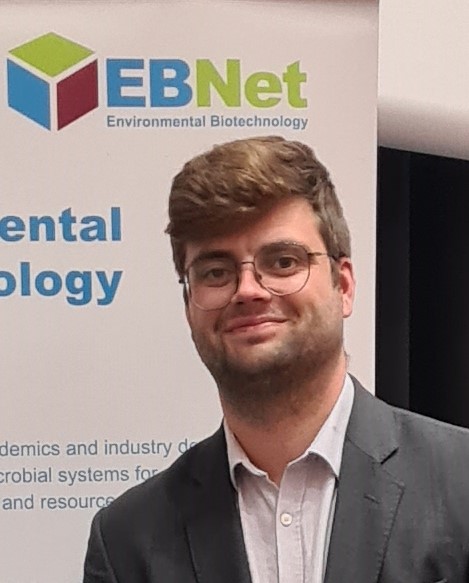
Interested?
Contact Dr Francis Hassard, Cranfield University.
Latest news
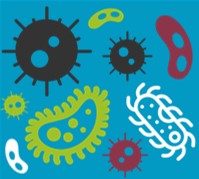 See here for recent items from this WG, and for more news click on the WB WG tag
See here for recent items from this WG, and for more news click on the WB WG tag
The WG Youtube Playlist is available here
For details of activities to March 2025 see the WB WG Report
WG Activities
Animation
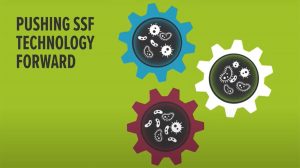 See the Slow Sand Filtration Animation, with a subtitled version here. This animation is part of EBNet’s series on microbiology and engineering. It explains the concepts behind slow sand filtration (SSF) for improved water quality – and some new developments in harnessing biofilms to produce microbiologically safe drinking water.
See the Slow Sand Filtration Animation, with a subtitled version here. This animation is part of EBNet’s series on microbiology and engineering. It explains the concepts behind slow sand filtration (SSF) for improved water quality – and some new developments in harnessing biofilms to produce microbiologically safe drinking water.
The novel technique described was based on work by Dr Francis Hassard and colleagues at Cranfield University, and has been awarded around £2M for trials under Ofwat’s Breakthrough Challenge 5: see here for information, and see below for some related publications.
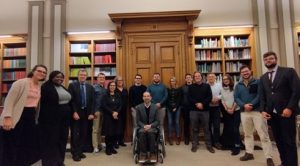 Workshop
Workshop
The WG’s Workshop on Engineering Beneficial Biofilms was held on 22 January 2025, RSC, London. This event brought together researchers, industry professionals, and policymakers to discuss the latest advances in engineering beneficial biofilms for water treatment. For outputs see the Position Statement, Research Priorities and full Workshop Report.
Webinars
Dr Hassard was Lead Organiser of the EBNet/NBIC Water Biofilms seminar series:
What are biofilms doing in our drinking water pipes? by Professor Joby Boxall, University of Sheffield – 21 September 2022, 12-13:00
Granular Activated Carbon Biofilms for Biomethanation from Wastewater by Dr Po-Heng Lee, Imperial College London – 6 July 2022, 12-13:00
Other activities
 Think you’ve got what it takes to save a city’s water supply from a major pollution event? The Escape Room Game Contamination Crisis was developed for the Water Biofilms WG by Dr Kristel Le Corre Pidou and colleagues at Cranfield University.
Think you’ve got what it takes to save a city’s water supply from a major pollution event? The Escape Room Game Contamination Crisis was developed for the Water Biofilms WG by Dr Kristel Le Corre Pidou and colleagues at Cranfield University.
EBNet supported Dr Francis Hassard to attend the 18th Congress of the International Union of Microbiological Societies (IUMS) in Florence, Italy on 23-24 Oct 2024.
Dr Hassard also kindly chaired and awarded the prizes for our EBNet ECR24 conference 24-26 July 2024, Newcastle University.
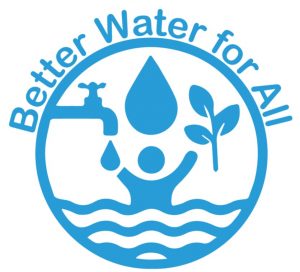 The concepts promoted by this Working Group are now being taken forward in the TERC Better Water for All Network+, led by Dr Bing Guo of the University of Surrey, with EBNet’s support and with Francis Hassard and Tom Curtis among the Co-Is. Join HERE now!
The concepts promoted by this Working Group are now being taken forward in the TERC Better Water for All Network+, led by Dr Bing Guo of the University of Surrey, with EBNet’s support and with Francis Hassard and Tom Curtis among the Co-Is. Join HERE now!
EBNet POC Funding
EBNet funded the following Proof-of-Concept (POC) projects in this area:
Bio-engineering of water biofilter communities for enhanced degradation of dissolved organic matter EBNet POC202106 Dr Marta Vignola, University of Glasgow
Fluorescent microbiofilter assay for rapid real-time monitoring of organic micropollutants biodegradation EBNet POC202113 Dr Caroline Gauchotte-Lindsay, University of Glasgow
Fibre Highways: Translocation of the microbiome for pollutant bioremediation EBNet POC202015 Dr Angela Sherry Northumbria University, Dr Jane Scott Newcatle University
Relevant Publications
Evaluating the impact of underwater skimming on slow sand filter performance and operation. Elemo, T., Chipps, M., Graham, N., Turner, A., Bretagne, S., Jefferson, B. and Hassard, F., 2025. Water Research, p.123234.
Understanding the risk of enhanced particle penetration into slow sand filter beds when using underwater skimming techniques. Elemo, T., Chipps, M., Graham, N., Turner, A., Jefferson, B. and Hassard, F., 2025. Journal of Environmental Management, 386, p.125845.
Predicting the impact of underwater skimming on dissolved oxygen consumption in slow sand filters for potable water treatment. Elemo, T., Chipps, M., Graham, N., Turner, A., Jefferson, B. and Hassard, F., 2024. Science of the Total Environment, 954, p.176730.
Microbial water quality investigation through flow cytometry fingerprinting: from source to tap
Claveau, L., Hudson, N., Jarvis, P., Jeffrey, P. and Hassard, F., 2024. Sustainable Microbiology, 1(1), p.qvae003.
Microbial Stratification and DOM Removal in Drinking Water Biofilters: Implications for Enhanced Performance. Shi, X., Pereira, R., Savage, L., Poursat, B., Quinn, D., Kostrytsia, A., Cholet, F., Smith, C.J., Gauchotte-Lindsay, C., Sloan, W.T. and Ijaz, U.Z., 2024. Water Research, 262, p.122053. (See also EBNET POC202106)


